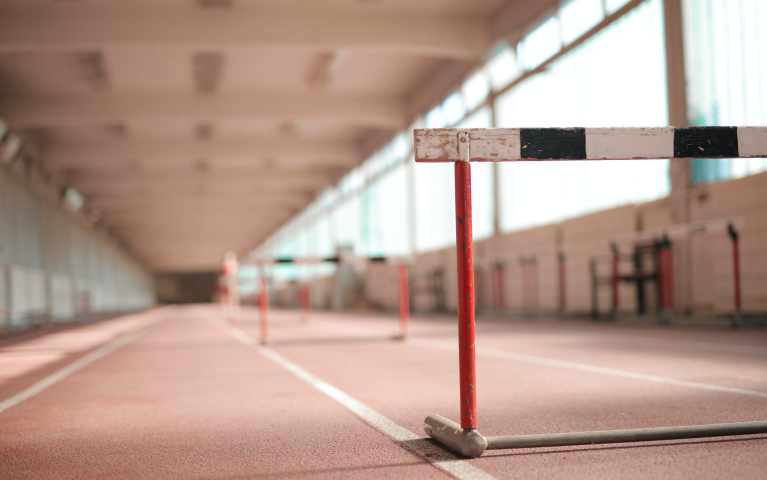Poor sleep affects athletic importance, experts say.
Playing sports takes a toll on athletes' bodies — and on their sleep.
Athletes face not only the demands of their sport, but also the challenge of managing personal life and business affairs away from the field or court. They often don't get enough sleep, especially if they are elite athletes at highly competitive levels. They may also experience fragmented sleep or insomnia.
“Challenges include overcoming stimulation from the excitement and arousal from night games, controlling pain from injuries, reducing accumulation of sleep debt from late night games and early practices, and limiting disruption of circadian rhythm from frequent travel," explained Dr. Jonathan Saluta, an orthopedic surgeon at Good Samaritan Hospital in Los Angeles. “Sleep along with nutrition are two of the most important factors influencing athletic performance and recovery."
Every team and individual sport requires both physical prowess and mental focus. In football, for example, poor sleep reduces a player's ability to adapt quickly to unfolding plays on the field, said Daron Roberts, who spent five years as an assistant coach in the NFL for the Chiefs, Lions and Browns.
“The NFL game really hinges on adjustment, having the awareness to see a formation or play and not just react, but to be able to change between different offenses or defenses between plays," Roberts said. “If these guys don't get enough sleep and they're sluggish, that could cost us a really big play."
Two things drive sleep, says Hugh Fullagar, a sport science coordinator at the University of Oregon, who studied the effects of going to bed earlier for elite soccer players. One is the body's need to rest after being awake a long time, and the other is the circadian rhythm, the body's internal clock, influenced by light exposure.
“When athletes encounter disruptions to their environments, circadian rhythms and normal sleep-wake cycles can become de-synchronized," Fullagar says.
These five factors can interrupt sleep cycles and make it harder to get adequate shut-eye:
-
Late night games. Playing games later in the evening can undermine sleep several ways. “The most obvious issue here is that when a player is attempting to sleep, the activity at night itself and post-match activities delay the time at which a player goes to bed," Fullagar says. “These later bedtimes invariably result in shorter sleep durations." Physiological reasons play a role too. Peak athletic performance occurs between 5 p.m. and 8 p.m., he says. Playing later raises the heart rate and the body's core temperature, which might make it harder to fall asleep.
-
Nighttime light exposure. Night games also mean bright floodlights on the field, or bright indoor lighting for other sports. Light represses melatonin, the hormone that tells the body to sleep. “Bright light exposure decreases sleepiness, increases alertness, and attenuates the nightly drop in core body temperature," according to one study published in the journal Sports Medicine. For top-level athletes going to press conferences after games, camera flashes and other lights add to the problem. So does using smartphones and other devices whose light has also been shown to delay melatonin release.
-
Travel, jet lag and erratic schedules. Most elite athletes travel for games, and that often means crossing several time zones. Jet lag “generally takes about one day per crossed time zone to adjust completely," states one study from Sleep Medicine Reviews. That's not always possible during intense season schedules. The same study noted that traveling eastward can be more difficult to adjust to than traveling westward, though it depends on when games occur. Variation in practice times, game times and time zones also make it hard to maintain a consistent sleep schedule, which is key to good sleep hygiene.
-
Game and post-game experience. What happens during or after games matters too. Winning can be so exciting it prohibits sleep. Losing can lead to stress, tension and a bad mood, which can also interfere with sleep. Anxiety before a game might affect some players, Roberts says, and players injured during a game may have trouble sleeping because of pain.
-
Lifestyle choices. Of all these reasons, athletes have the most control over lifestyle choices affecting sleep. Caffeine ingested up to 6 hours before bedtime impairs sleep, yet players often chew caffeinated gum or swig energy drinks at halftime. Drinking alcohol in post-game celebrations also disrupts sleep. Though it may be tempting to unwind with a movie or by playing games on a smartphone or tablet, the light exposure and shift in focus make it harder to quiet the mind and begin getting those ZZZs.
Like diet and exercise, quality sleep is essential for optimal wellbeing and performance. Because everyone's sleep needs are different, Sleep Number® smart beds sense your movements and automatically adjust firmness, comfort and support to keep you both sleeping comfortably. Find your Sleep Number® setting for your best possible night's sleep, and if you own a Sleep Number® smart bed, log in to your Sleep Number® Rewards account to see your exclusive offers, refer friends and more.
